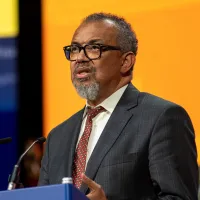The end of aid is an opportunity for sustainable self-reliance
29 July, 2025
This article appeared as a contribution to the 2025 Ibrahim Forum Report, Financing The Africa We Want.
The theme of the recent Ibrahim Governance Weekend – Financing The Africa We Want – is very significant to me. In fact, The Africa We Want was the catch-cry of Agenda 2063, the 50-year development blueprint for Africa, which I had the honour to shape as Chair of the 50th anniversary of the African Union Executive Council, with the then chair of the African Union Commission, Dr Nkosazana Dlamini Zuma.
However, the most recent report on the implementation of Agenda 2063 shows that despite some progress, our continent is off track on many indicators. In the past five years, we have suffered two major setbacks: First, the COVID-19 pandemic; and second, the sudden and steep cuts to aid that are causing severe disruptions to health services on which millions of people rely. As the report prepared for the conference showed, billions of dollars in aid disappeared virtually overnight.
The impact is severe. Lifesaving medicines are sitting in warehouses, people are missing out on treatments, clinics have closed, health workers have lost their jobs, and health information systems and supply chains are breaking down.
Although this is an acute crisis now, it is a crisis long in the making. Many health systems around the world, and especially here in Africa, have long suffered from chronic underinvestment. As a result, out-of-pocket spending is the main source of health financing in 27 African countries. In ten nations, more than half of all health spending comes from out-of-pocket payments. At the same time, debt servicing costs in many countries restrict their ability to invest in health. In fact, many countries spend more on debt interest payments than on education and health combined.
These conditions have contributed to heavy aid dependency in many countries. Much aid does not flow through treasuries, but through parallel systems set up by donors. This makes forward planning and budgeting impossible. This deep reliance has created a deep vulnerability that has now been exposed.
But although many countries are facing serious challenges, many African leaders have told me that they also see this current crisis as an opportunity to leave behind the era of aid dependency and transition towards sustainable self-reliance. WHO is supporting countries to make that transition, by identifying ways to improve efficiency and generate new revenue for health. For example, through pooled procurement, by introducing or increasing taxes on tobacco and alcohol, public health insurance, and by using health technology assessment to ensure they get the biggest health benefit for the money.
But the transition to self-reliance is about more than health. It’s about creating a level playing field so Africa can compete fairly with the rest of the world. There are technical solutions that we need to put in place, including 23 collective bargaining, strengthening the continental free trade area and increasing intra-Africa trade, improved tax collection, and investments in job creation and manufacturing.
We also need to fight corruption and illicit trade, which costs this continent more than we receive from official development assistance and direct foreign investment. If you stop illicit financing, then that would be enough for both investment and development.
But primarily, we need a change of mindset. We cannot look to others to solve our problems for us. As Africans, the responsibility lies with us to make the transition to a self-reliant future. The mindset of aid dependency has to stop.
First, now is the time for leadership from governments, to shake off the yoke of aid dependency and chart the path to self-reliance by mobilising domestic resources to support primary healthcare as the foundation of universal health coverage. Second, we need leadership from lenders, in the form of concessional lending, at fair terms. And third, we need leadership from generous donors, not to pay salaries and operating costs for health programmes, but to build capacity so we can run them ourselves. Self-reliance means national systems, national budgets and national priorities, in alignment with the Lusaka Agenda and the principles of 'one plan, one budget, one report'.
WHO stands ready to support all countries, and to work with all partners to turn this crisis into an opportunity. The choices we make now will shape the future of global health financing. We must get it right. Because ultimately, health is not a cost to be contained. It is an investment to be nurtured – an investment in people, stability and economic growth, so that we can, together, build a healthier, safer, and fairer Africa for all.



